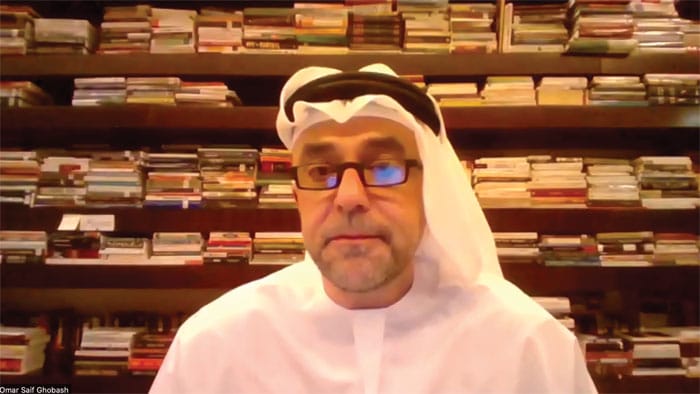
Omar Saif Ghobash, Assistant Minister for Culture and Public Diplomacy for the United Arab Emirates (UAE), discussed the Abraham Accords in a November 7 webinar with American Jewish University President Jeffrey Herbst.
The Abraham Accords are a series of peace agreements forged between Israel and various Arab nations in 2020, including the UAE, Bahrain and Morocco. Ghobash said that the Accords “shook up the Arab and Muslim world” and “overturned traditional thinking” since it “ended a taboo.” He added that the COVID-19 pandemic has “tested” the UAE’s relationship with Israel since the two countries decided to work together to help fight the pandemic.
“This was actually much more a people-to-people peace than the other kinds of peace you see in the region,” Ghobash said. He pointed to the fact that Emirate Airlines now provides direct flights to Tel Aviv and the two countries’ Chambers of Commerce have been working together as a “really significant signal that this relationship is a special relationship for us.”
On the issue of Iran, Ghobash said that it’s “not one that pops up in daily conversation in the ministry nor with our diplomatic friends” but they will “continually draw attention” to Iran’s behavior in the Middle East. He didn’t comment on President Joe Biden’s efforts to revive the 2015 Iran nuclear deal, saying that “we can’t control the way the United States deals with Iran, we can only control Iranian behavior.” The UAE’s main focus has been on maintaining “our sovereignty” and “economic development,” Ghobash said, which is why it made “strategic” sense to make peace with Israel over the Jewish State’s “technical and intellectual power.”
As for the UAE’s relationship with the Biden administration, Ghobash said that “we recognize that this a much deeper relationship than we may have seen at the time we signed the agreements.”
Ghobash also discussed how Arab leadership has dealt with extremism in the Muslim world, saying that the 9/11 terror attacks were “a big shock not just to the United States but to the emirates as well.” He accused Islamic extremists of “hijacking” and adopting “a very narrow and violent interpretation” of the Muslim faith. Ghobash cited the UAE’s partnership with the United States to fight the Taliban in Afghanistan as an “instance of us taking a tangible step beyond mere words.” He also warned of the rise of the Muslim Brotherhood for promoting a “more aggressive form of political Islam” and accused the Brotherhood of having links that extend all the way to ISIS.
“We believe in tolerance,” Ghobash said, pointing to the fact that the UAE held a mass with Pope Francis in Abu Dhabi in 2019 as an example of how the UAE believes in an “accepting” form of Islam.
When asked which Arab countries could be next to join the Abraham Accords, Ghobash didn’t want to speculate, saying that it was better to focus on the current agreements in place. “Quality not quantity,” he said, arguing that otherwise “the work we’re doing would become less significant and [be] put on the backburner.”
On the Israeli-Palestinian conflict, Ghobash said that some Arab countries have a smooth relationship with the Palestinian leadership while others don’t, but regardless they don’t expect to resolve the conflict with the Abraham Accords. The Accords did result in talk of a freeze in Israeli settlements in the West Bank, Ghobash said, but “we can’t solve [the Palestinians’] problem for them.”
The Abraham Accords are more than just a peace agreement; they are “normalizing the idea of Jewish orthodoxy [in the UAE].”
The Abraham Accords are more than just a peace agreement; they are “normalizing the idea of Jewish orthodoxy [in the UAE]… we have accepted the entire gamut of Israeli and Jew,” Ghobash said. He acknowledged that it’s going to be a “long uphill slog” to eradicate antisemitism in the Arab world but expressed optimism about the younger generation, as they are “more attached to [a] global presence” and that there are “more good ideas than bad ideas in the UAE…In that sense, I am optimistic.”
Ghobash also discussed how he’s writing a novel about his father’s last day alive; his father was a diplomat who was killed in a terror attack. Ghobash said he views the book as “an artifact of his memory” and will then move on from it.























 More news and opinions than at a Shabbat dinner, right in your inbox.
More news and opinions than at a Shabbat dinner, right in your inbox.